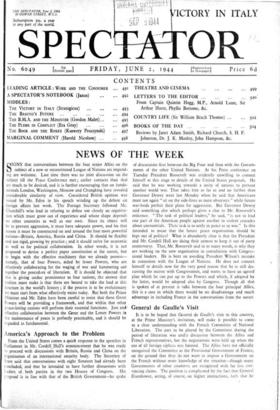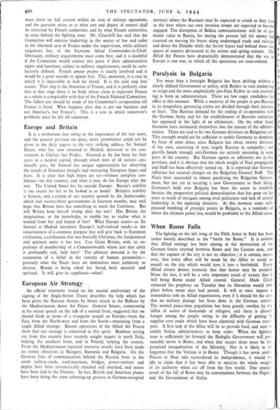General de Gaulle's Visit
It is to be hoped that General de Gaulle's visit to this country, at the Prime Minister's invitation, will make it possible to come to a clear understanding with the French Committee of National Liberation. The part to be played by the Committee during the period of liberation was under discussion between the Allies and Prench representatives, but the negotiations were held up when the use of all foreign ciphers was banned. The Allies have not officially recognised the Committee as the Provisional Government of France, on the ground that they do not want to impose a Government on the French without more knowledge of the situation—though many Governments of other countries are recognised with far less con- vincing claims. The position is complicated by the fact that General Eisenhower, acting, of course, on higher instructions, feels that he
must insist on full control within an area of military operations, and the question arises as to what sort and degree of control shall be exercised by French authorities, and by what_French authorities, in areas behind the fighting zone. Mr. Churchill has said that the Committee will exercise leadership in the matter of law and order in the liberated area of France under the supervision, while military exigencies last, of the Supreme Allied Commander-in-Chief. Obviously, military requirements must come first, and it is doubtful if the Committee would contest this point if their administrative rights and functions, subject to military requirements, could be satis- factorily defined. French amour propre is clearly involved and it would be a great mistake to ignore that. This, moreover, is a case in which it is impossible to look far ahead. It is the next step that ' counts. That step is the liberation of France, and it is perfectly clear that at that stage there is no body whose claim to represent France as a whole is comparable with that of the French National Committee. The fullest use should be made of the Committee's co-operation till France is freed. What happens after that is not our business and not America's, but France's. This is a case in which tomorrow's problems must be left till tomorrow.



























